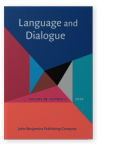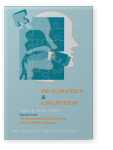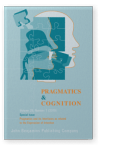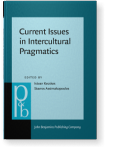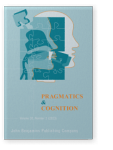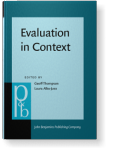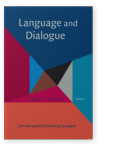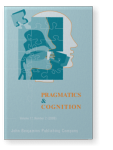István Kecskés
List of John Benjamins publications for which István Kecskés plays a role.
Journals
ISSN 0929-0907 | E-ISSN 1569-9943
Titles
Pragmatics and its Interfaces as related to the Expression of Intention
Edited by István Kecskés
Special issue of Pragmatics & Cognition 26:1 (2019) vi, 165 pp.
Subjects Cognition and language | Cognitive psychology | Discourse studies | Philosophy | Pragmatics
From Pragmatics to Dialogue
Edited by Edda Weigand and István Kecskés
[Dialogue Studies, 31] 2018. v, 222 pp.
Subjects Dialogue studies | Discourse studies | Pragmatics
Current Issues in Intercultural Pragmatics
Edited by István Kecskés and Stavros Assimakopoulos
[Pragmatics & Beyond New Series, 274] 2017. vii, 369 pp.
Subjects Discourse studies | Pragmatics
2023 Language variation and temporary norm development in intercultural interactions Pragmatics & Cognition 30:2, pp. 235–257 | Article
The paper argues that interlocutors in intercultural interactions rely mainly on co-constructed temporary norms rather than on codified norms of the target language. There is a complex interplay of codified and emergent norms that drives interaction. Temporary norms emerge through temporary… read more
2023 Chapter 4. Face-to-face intercultural communication and mediated intercultural communication as related to health communication A Pragmatic Agenda for Healthcare: Fostering inclusion and active participation through shared understanding, Bigi, Sarah and Maria Grazia Rossi (eds.), pp. 106–123 | Chapter
The chapter argues that any communication happens in a specific context composed of three aspects: individual experience-based sociocultural aspect (CA), actual situational aspect (SA), and aspect of language as a tool of communication (LA). CA refers to the attitudinal frame of reference a… read more
2019 The interplay of prior experience and actual situational context in intercultural first encounters Pragmatics and its Interfaces as related to the Expression of Intention, Kecskés, István (ed.), pp. 112–134 | Article
The study aims to investigate how prior experience of interlocutors interacts with actual situational context in intercultural interactions when the latter is represented by a well-known frame: getting acquainted with others. It attempts to demonstrate how the cultural frame of the target… read more
2019 “Pragmatics and its interfaces as related to the expression of intention” Pragmatics and its Interfaces as related to the Expression of Intention, Kecskés, István (ed.), pp. 1–4 | Introduction
2018 Introduction From Pragmatics to Dialogue, Weigand, Edda and István Kecskés (eds.), pp. 1–4 | Chapter
2017 Chapter 9. Implicitness in the use of situation-bound utterances Implicitness: From lexis to discourse, Cap, Piotr and Marta Dynel (eds.), pp. 201–216 | Chapter
This chapter discusses the nature of implicit knowledge encoded in situation-bound utterances (SBUs) that are defined as highly conventionalized, prefabricated pragmatic units whose occurrences are tied to standardized communicative situations because they serve as interactional patterns and… read more
2017 Introduction Current Issues in Intercultural Pragmatics, Kecskés, István and Stavros Assimakopoulos (eds.), pp. 1–6 | Introduction
2014 The evaluative function of situation-bound utterances in intercultural interaction Evaluation in Context, Thompson, Geoff † and Laura Alba-Juez (eds.), pp. 137–152 | Article
This chapter aims to examine the evaluative function of situation-bound utterances in intercultural interactions. The subject of inquiry is a unique formula whose use is tied to certain reoccurring situations. Situation-bound utterances (SBU) are frequently used in any language because these… read more
2012 Is there anyone out there who really is interested in the speaker? Language and Dialogue 2:2, pp. 283–297 | Article
This paper discusses two important issues of current pragmatics research as related to dialogue and discourse: interest in the hearer rather than the speaker, and focus on utterance rather than dialogue and discourse segment. These two issues are intertwined, and they are each other’s consequences.… read more
2010 The paradox of communication: Socio-cognitive approach to pragmatics Pragmatics and Society 1:1, pp. 50–73 | Article
Communication is not as smooth a process as current pragmatic theories depict it. In Rapaport’s words “We almost always fail […]. Yet we almost always nearly succeed: This is the paradox of communication” (Rapaport 2003: 402). This paper claims that there is a need for an approach that is able to… read more
2009 Activating, seeking, and creating common ground: A socio-cognitive approach Pragmatics & Cognition 17:2, pp. 331–355 | Article
This paper argues that current pragmatic theories fail to describe common ground in its complexity because they usually retain a communication-as-transfer-between-minds view of language, and disregard the fact that disagreement and egocentrism of speaker-hearers are as fundamental parts of… read more

